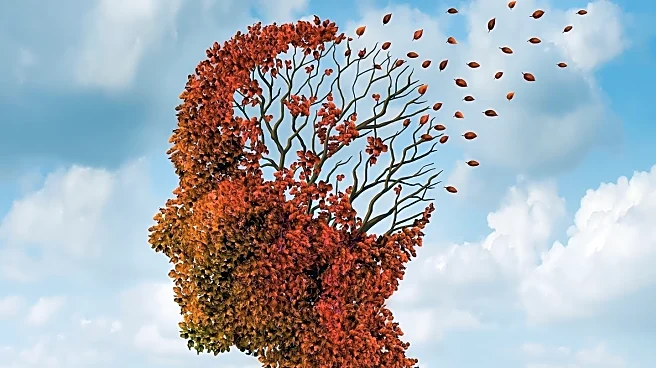What is the story about?
What's Happening?
A neurologist has highlighted five subtle signs that may indicate an increased risk of dementia, emphasizing the importance of early detection for cognitive health. These signs include difficulty balancing on one leg for about 10 seconds, trouble rising from a chair without using hands, acting out dreams during sleep, persistent feelings of loneliness, and a weak hand grip. These indicators, often overlooked, can reflect early changes in the brain. Studies have shown that poor balance may be linked to small-vessel disease in the brain, while difficulty with the 'sit-to-stand' test correlates with reduced blood flow and brain function. Acting out dreams could suggest REM Sleep Behavior Disorder, which is associated with early brainstem degeneration. Loneliness has been linked to reduced grey matter in memory regions, and a weak grip may indicate overall frailty and inflammation.
Why It's Important?
Identifying these early signs is crucial as they offer a window into potential cognitive decline, allowing for timely intervention. Early detection can lead to better management of dementia risks and improve long-term cognitive health. The implications are significant for public health, as dementia affects millions of individuals and their families, leading to substantial healthcare costs. By recognizing these signs, individuals can take proactive steps, such as engaging in resistance training and maintaining social connections, to potentially mitigate the progression of cognitive decline. This awareness can also guide healthcare providers in developing targeted strategies for at-risk populations.
What's Next?
Further research and public awareness campaigns could enhance understanding and recognition of these early signs. Healthcare providers may consider incorporating these indicators into routine screenings for older adults. Additionally, individuals experiencing these symptoms might seek medical advice for early intervention strategies. As studies continue to explore the links between physical health and cognitive function, new preventive measures and treatments could emerge, offering hope for reducing the incidence of dementia.
Beyond the Headlines
The identification of these signs also raises ethical considerations regarding early diagnosis and the potential for anxiety or stigma associated with dementia risk. It highlights the need for supportive resources and counseling for individuals and families facing these challenges. Moreover, it underscores the importance of holistic approaches to health that integrate physical, mental, and social well-being.















